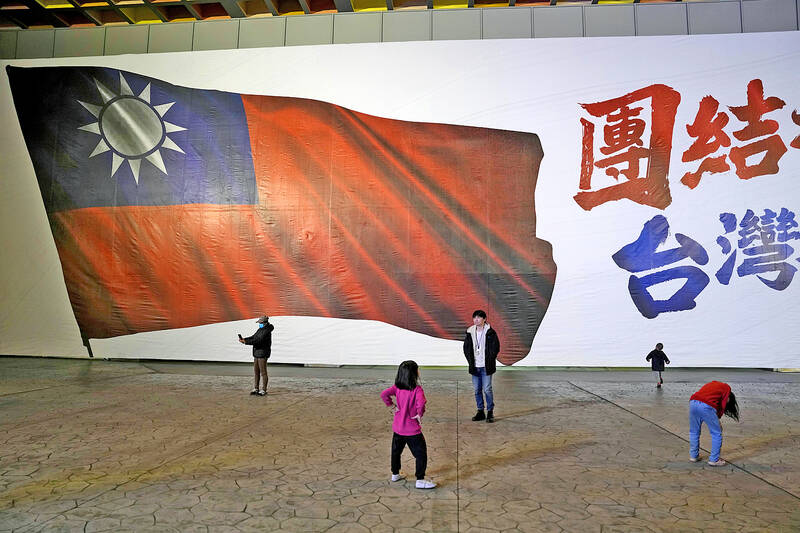Achieving a consensus on how Taiwanese view the China threat and US security commitments to Taiwan would be challenging for president-elect William Lai (賴清德), a US academic said in an article published on Wednesday.
In an article in Foreign Policy, Timothy Rich, a professor of political science and director of the International Public Opinion Lab at Western Kentucky University, analyzed how Taiwanese public opinion would affect the incoming administration.
Seoul-based Macromill Embrain Co early last month conducted a survey commissioned by Rich, garnering valid responses from 1,213 Taiwanese voters.

Photo: Ng Han Guan, AP
More than 60 percent of respondents were “moderately,” “very” or “extremely” concerned about an invasion by China, Rich said, citing the survey.
The results were divided along party lines, with 46.85 percent of respondents who said they backed the Democratic Progressive Party (DPP) being “not at all” or “slightly” concerned, while 43.23 percent of Chinese Nationalist Party (KMT) supporters were “very” or “extremely” concerned, Rich said, adding that responses from Taiwan People’s Party (TPP) supporters “fell in between.”
The divergence in opinion indicates that “the Lai administration will struggle to build a consensus on the China threat,” he said.
More than 60 percent were “not at all” or “not very” confident that the US would defend Taiwan if China were to launch a war against the nation, he said.
The survey showed a partisan split — with 22.44 percent of DPP supporters “very” confident and 50.39 percent “fairly” confident that Washington would honor security commitments to Taiwan, he said.
Among KMT supporters, 77.6 percent were “not at all” or “not very” confident in US promises, while 69.43 percent of TPP supporters gave the same responses, he said.
The high confidence that the US would provide support among DPP supporters might be because they believe that the administration of President Tsai Ing-wen (蔡英文) “has received additional private assurances from Washington,” Rich said.
Surveys in the past two years showed similar trends, he added.
Taiwanese across the political spectrum want peace and hope that the “status quo” is maintained, while a growing proportion identify themselves as Taiwanese, annual polls conducted by National Chengchi University showed.
Rich said the Macromill Embrain survey showed that 78.13 percent of KMT supporters believed cross-strait relations over the past year had worsened — with the party blaming Tsai’s administration — while 46.06 percent of DPP supporters agreed.
“Critically for future relations with China and the world, the Lai administration must adopt a posture of strength while not inviting conflict,” Rich said. “This may be a difficult task given the changing composition and views of Taiwanese citizens.”
With no party winning a legislative majority, cross-strait policies might remain moderate even if Lai takes a tough stance against China, he said.
Lai’s government “may not only struggle to pass military spending and reform bills, but also risk mixed messaging — a situation China will be keen to exploit,” he said.

The manufacture of the remaining 28 M1A2T Abrams tanks Taiwan purchased from the US has recently been completed, and they are expected to be delivered within the next one to two months, a source said yesterday. The Ministry of National Defense is arranging cargo ships to transport the tanks to Taiwan as soon as possible, said the source, who is familiar with the matter. The estimated arrival time ranges from late this month to early next month, the source said. The 28 Abrams tanks make up the third and final batch of a total of 108 tanks, valued at about NT$40.5 billion

Two Taiwanese prosecutors were questioned by Chinese security personnel at their hotel during a trip to China’s Henan Province this month, the Mainland Affairs Council (MAC) said yesterday. The officers had personal information on the prosecutors, including “when they were assigned to their posts, their work locations and job titles,” MAC Deputy Minister and spokesman Liang Wen-chieh (梁文傑) said. On top of asking about their agencies and positions, the officers also questioned the prosecutors about the Cross-Strait Joint Crime-Fighting and Judicial Mutual Assistance Agreement, a pact that serves as the framework for Taiwan-China cooperation on combating crime and providing judicial assistance, Liang

A group from the Taiwanese Designers in Australia association yesterday represented Taiwan at the Midsumma Pride March in Melbourne. The march, held in the St. Kilda suburb, is the city’s largest LGBTQIA+ parade and the flagship event of the annual Midsumma Festival. It attracted more than 45,000 spectators who supported the 400 groups and 10,000 marchers that participated this year, the association said. Taiwanese Designers said they organized a team to march for Taiwan this year, joining politicians, government agencies, professionals and community organizations in showing support for LGBTQIA+ people and diverse communities. As the first country in Asia to legalize same-sex

MOTIVES QUESTIONED The PLA considers Xi’s policies toward Taiwan to be driven by personal considerations rather than military assessment, the Epoch Times reports Chinese President Xi Jinping’s (習近平) latest purge of the Chinese People’s Liberation Army (PLA) leadership might have been prompted by the military’s opposition to plans of invading Taiwan, the Epoch Times said. The Chinese military opposes waging war against Taiwan by a large consensus, putting it at odds with Xi’s vision, the Falun Gong-affiliated daily said in a report on Thursday, citing anonymous sources with insight into the PLA’s inner workings. The opposition is not the opinion of a few generals, but a widely shared view among the PLA cadre, the Epoch Times cited them as saying. “Chinese forces know full well that